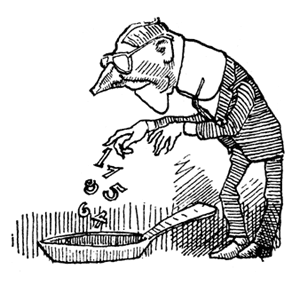How long should this post be? A thousand words? Exactly? One of the novelties of the Internet era is that journalism has been freed from the constraints of the printed page. Instead of conforming to the conventions of the column, the quarter page, the half page—limits that often meant unfortunate last-second cuts—the writer could now make the story as short or as long as seemed right.
But what is right? A regular reader of The Guardian online, I often find its featured articles tiresomely long and rambling. You scroll down, imagining the piece almost over, and instead it goes on, and on. There should have been some warning at the beginning telling you how many words lie ahead. So, no sooner does the Internet give us oceans of space than we realize that length was never just a problem of column inches. As with the editing process, which I discussed in a previous post, there is the question of an understanding between writer and reader about what kind of reading experience is being offered. Readers like to suppose that their favorite writers—journalists, novelists, or poets—are absolutely independent, free from all interference, but the truth is that if an author indulges his own private idiolect or goes on for too long, he can at best expect to divide readers into those who admire him slavishly, whatever he throws at them, and those who set him aside in desperation. At worst he will be left with no readers at all.
Is there a relationship between a writer’s respect for these conventions and the content or tone of what he writes, the kind of opinions we can expect him to have? I have recently been re-reading Dickens, who published his novels in weekly or monthly installments with strict limits on both the number of words in each installment (around 18,500 for a monthly and 4,700 for a weekly) and the total number of installments (twenty for a monthly, thirty or more for the weekly). Many other novelists published in this way of course, but few relished the form as Dickens did. His contemporary Trollope would write an entire book before allowing its serialization to begin, so anxious was he to stay in control, while Thomas Hardy intensely disliked working for the popular magazines, with the propriety they demanded, and reserved the right to publish an uncensored version in a single volume when the serialization was through. By contrast, Dickens did not worry about having the plot entire in his head before he started, and enjoyed the constant feedback from readers, which arguably influenced the shape his stories took. Only once, on the death of his wife’s sister, did he disappoint his public and miss an installment.
The adaptability is hardly surprising. Again and again, the narrative trigger in Dickens’s stories comes in the form of a threat to some happy community—be it a family, or a group of friends or work colleagues—from one or more antagonists who are mean, greedy and, above all, inflexible. Mr. Murdstone and his sister, who take over and destroy the Copperfield family with their ideals of “firmness,” offer a classic example. The ensuing unhappiness will then very likely be righted by some benevolent avuncular figure who hovers at the edge of the picture but is entirely dedicated to creating the conditions in which the community can flourish. Such is Arthur Clennam in Little Dorrit. And such of course is Dickens himself, who never lets his readers down by missing an installment or by writing too much or too little, and whose books, however heartrending, could keep a community of them happy over long periods of time.
That in his own family life Dickens was ultimately unable to be so magnanimous, not only separating from his wife (and mother of ten) but also refusing to see any family member who remained in touch with her, only suggests that he may have been able to empathize as much with his villains as his victims. No one was more inflexible than Dickens when it came to work hours; no one bargained harder with publishers. But to the readers in his thrall he was always benevolent and accommodating. His own self-esteem depended not simply on their admiration, but on their belief in his good will in their regard. Hence it’s not surprising that he later gave public readings all over England and the United States, and again was happy to edit his work to get the length of the readings just right and the effects as pleasing as possible. True, widespread pirating of his work in the States meant the money was important to him, but it was always the community with the reader that mattered most.
I believe it would be possible to connect most authors’ attitudes toward editing and their readers with the themes and content of their work. Chekhov happily accepted length constraints, even at the height of his fame. He loved to be popular, but at the same time liked relationships to be brief and not too involving. He had a small private apartment built a moment’s walk away from his country house so he could make short but intense appearances among family and friends, then escape to his writing. His preference for short stories rather than novels was not casual. In those wonderful stories, long relationships are almost always a mistake.
Advertisement
The blogosphere, with its wonderful but dangerous flexibility, can ruthlessly betray an author’s attitude toward his readers. Does he respect their precious time and keep things tight? Is he sensitive to their expectations? Is he willing to read the comments on his post and perhaps even respond to them? Dickens, one suspects, might have spent many hours online discussing the fate of Pip Pirrip or Little Nell. As for me, I’m glad to listen to editors and produce an article, and eager to have it widely read. But I’m relieved not to be contractually obliged to engage with readers afterward.



